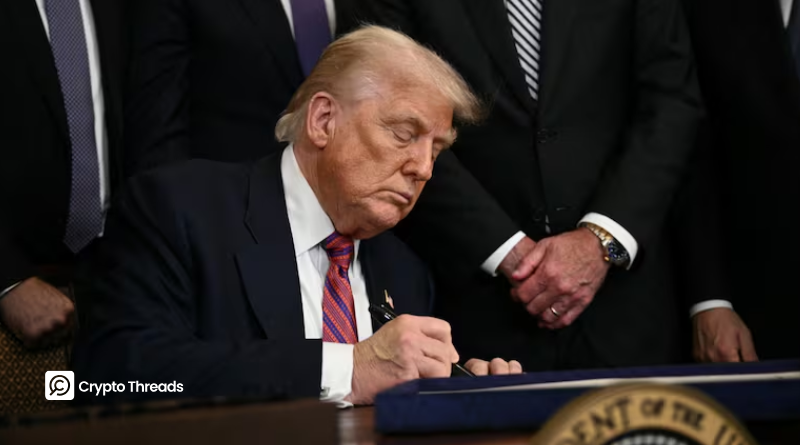Banking Groups Push for Changes to Trump-Signed GENIUS Act Over Stablecoin Risks
The U.S.’s biggest banking associations are warning that a new stablecoin law could weaken the financial system, unless Congress closes what they see as dangerous loopholes.
- GENIUS Act, signed by President Trump, sets rules for U.S. stablecoins but banks say gaps remain.
- Main concern: loopholes that allow interest payments to stablecoin holders through affiliates.
- Banks argue this could draw deposits away from traditional lending, hurting credit creation.
- Banking groups want the prohibition extended to exchanges, brokers, and dealers.
- Coinbase’s Paul Grewal disputes the loophole claims, calling it an attempt to avoid competition.
President Donald Trump’s signing of the Guiding and Establishing National Innovation for U.S. Stablecoins (GENIUS) Act last month was hailed as a major step for digital asset regulation. But now, the country’s largest banking groups – led by the American Bankers Association (ABA) and 52 other organizations – are urging the Senate Banking Committee to tighten the law.
In a letter to Senate leaders, the groups flagged concerns over interest payments to stablecoin holders. While the GENIUS Act limits such payments, banks say the rules can be sidestepped by routing them through affiliates like exchanges, brokers, and dealers. This, they argue, risks turning stablecoins into yield-bearing instruments and credit substitutes rather than simple payment tools.
According to the letter, such shifts could pull deposits out of traditional banks and into stablecoins, undermining the banking sector’s ability to turn deposits into loans. The groups warned this could lead to a contraction in credit supply, higher interest rates, fewer loans, and increased costs for businesses and households.
They called on Congress to extend the interest prohibition to cover all related entities in the digital asset space, arguing this would preserve banks’ role in credit intermediation while allowing stablecoin innovation to continue responsibly. They also emphasized the need to address the issue as part of broader crypto market legislation.
Some industry voices, however, strongly disagree. Coinbase Chief Legal Officer Paul Grewal dismissed the concerns, saying there’s no loophole at all and accusing banking groups of trying to avoid competition. “376 Democrats and Republicans in the House and Senate rejected your unrestrained effort to avoid competition,” Grewal posted on X. “So did one President. It’s time to move on.”
Final Thought
The clash over the GENIUS Act reflects the growing tension between traditional banking interests and the crypto industry. Whether Congress moves to close the alleged loophole could shape how stablecoins compete, or coexist, with the banking system in the years ahead.



